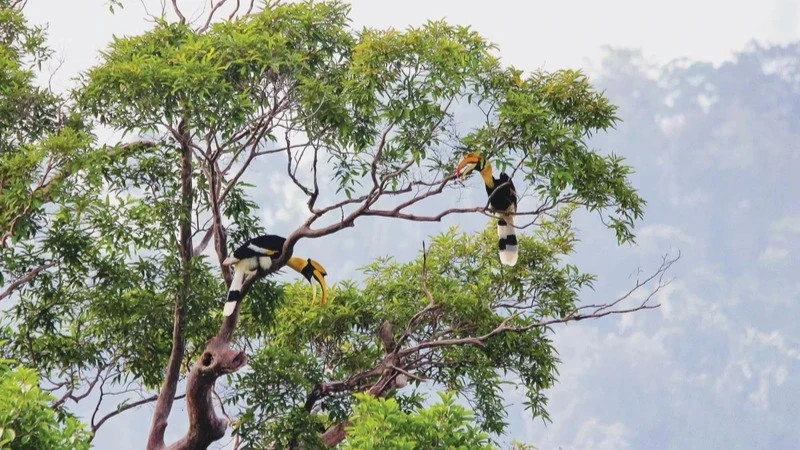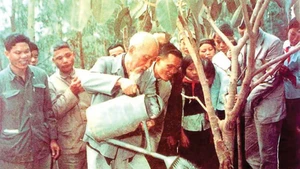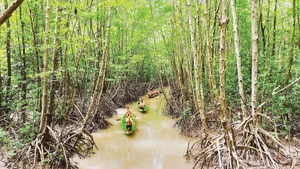With over 14.86 million hectares of forest land and a forest cover rate of 42.02%, Vietnam’s forests are home to more than 10,000 species of animals and 12,000 species of higher plants, including over 7,000 non-timber forest products. The forest ecosystems in Vietnam significantly contribute to the economy and human welfare through the services they provide, such as timber, non-timber forest products, water regulation, greenhouse gas absorption, and ecotourism.
Forests are also home to around 25 million people, primarily ethnic minority communities with distinctive cultural characteristics imbued with national identity. This represents a great potential for developing the values of forest ecosystems, including the benefits they bring about.
According to the Department of Forestry (Ministry of Agriculture and Rural Development), Vietnam’s geographical location and varying terrain and climate factors have created a rich diversity of forest ecosystems. However, current ecotourism activities and local cultural values promotion in communities living near forests have not yet fully realised their potential. Therefore, it is necessary to conduct surveys and assessments and collaborate with relevant organisations to build communication and promotion programmes for forests, especially national parks, and consider creating a “forest passport” model. With this initiative, each visitor to the forest would be marked as having embarked on a journey of exploring nature contributing to building and protecting forests sustainably.
Recently, the forestry sector organised a forum on “Public-Private Partnership in Developing the Multi-Purpose Value of Forest Ecosystems” and launched the “National Park Passport Initiative.” These are excellent initiatives garnering the support of businesses, organisations, and individuals domestically and internationally, pooling resources to invest in the forest economy.
Vietnam has abundant and diverse forest ecosystem values. To realise the objectives of forestry development in the 2021-2030 period, with a vision to 2050, the forestry sector is introducing appropriate mechanisms and policies to facilitate and encourage organisations and individuals from all economic sectors to invest in forestry development.
One significant push is the cooperation agreement signed between the Department of Forestry and Suntory PepsiCo Vietnam. This is one of the earliest strategic partners with the forestry sector in sustainable forest development aimed at water conservation and carbon neutrality.
The main areas of cooperation in the agreement include afforestation linked to improving the livelihoods of local people, aiming to increase carbon absorption and neutrality, protect the environment, and regenerate water resources. This is achieved through planting forests, rehabilitating and enriching natural forests, and restoring ecosystems and natural landscapes with native and large timber species.
One highlight of these cooperative activities is the pilot implementation of the “National Park Passport” programme, which will encourage people and tourists to explore and experience forests while fostering awareness about forest protection and development, thus promoting the multi-purpose value of forests.
Director of the Forestry Department, Tran Quang Bao, stated that the forestry sector aims to become a technical, economic sector by establishing, managing, protecting, developing, and sustainably using forests, ensuring broad and equal participation from all economic sectors in forestry activities. Therefore, the role of both the public and private sectors is crucial. Through cooperation with partners, hundreds of hectares of forests will be newly planted and enriched, especially in upstream forests and protective forest areas across the country. The forests will include large timber trees and native species, combined with non-timber forest products and medicinal plants, to improve local livelihoods.
This is the first time the “National Park Passport” initiative has been implemented in Vietnam to create a mechanism to promote ecotourism development in national parks and nature reserves. In the initial phase, the “National Park Passport” will be applied at 34 national parks in the special-use forest system that offer tourism activities. Both domestic and international tourists can acquire the “passport” in either paper or electronic form.
Visitors possessing the passport will also have the opportunity to receive special offers and prizes when visiting national parks and meeting the required conditions. The “National Park Passport” will motivate tourists to experience and explore the values of forest ecosystems, gradually creating a sustainable financial mechanism. It will also serve as a boost for national parks and nature reserves with tourism infrastructure to increase visitor numbers while attracting community interest in the sustainable values of ecosystems.
















